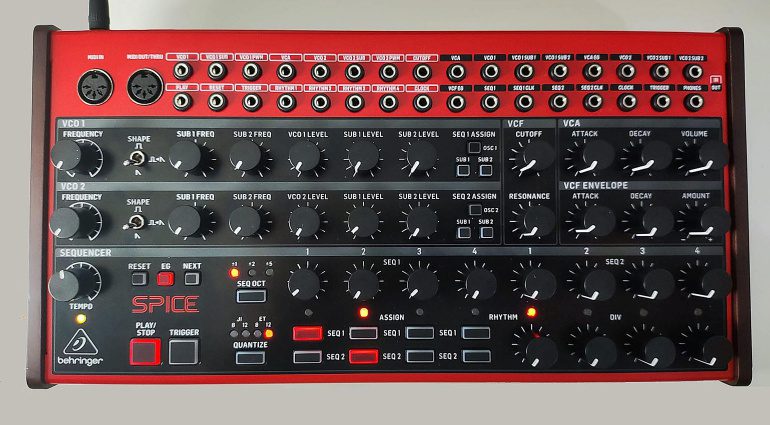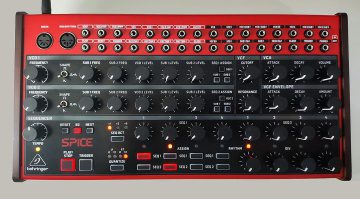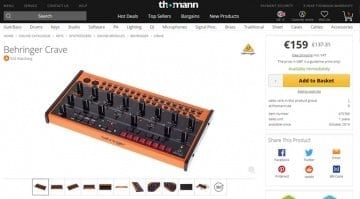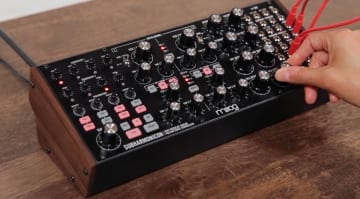Behringer SPICE: The long expected Subharmonicon clone is revealed
Behringer completes its tryptic of Moog clones with SPICE, a colourful take on the Subharmonicon. Along with Crave and Edge, it makes for a powerful collection of synths; there are more to come.
SPICE
The announcement was made on Facebook and comes with no details except to say it comes with full MIDI/USB implementation and should cost $249. We know it’s a Subharmonicon clone because, well, just look at it. It has all the same knobs, labels, patch sockets and feature set.
The Subharmonicon is a semi-modular analogue polyrhythmic synthesizer. It uses a 6-tone sound engine and multi-layered clock generator to explore subharmonics, polyrhythms and how they interact to generate rich harmonic kaleidoscopes. It has two VCOs and four subharmonic oscillators. The subharmonic notes are mathematically derived from the VCOs making for interestingly coherent relationships. You then animate the notes with a pair of 4-step sequencers driven by mathematical divisions of the master tempo.
Was Behringer also inspired by Joseph Shillinger’s mathematical system for musical composition? It probably studied the Mixtur-Trautonium and Rhythmicon and remarkably arrived at the exact same instrument.
How does it look?
SPICE combines the mathematical functions in a nicely compact and clearly laid out instrument. Behringer has gone for a horizontal vibe rather than the stacked form of the Subharmonicon. That offsets the sequencers so that they no longer sit together above the division knobs, which feels a little incongruous. The Crave, Edge and Spice are unlike many of the other desktop synths in that they are not in a Eurorack-compatible form. Many commentators are asking for a Moog-style three-tier rack stand to mount these in, which Behringer already does for the rackable synths.
The colours are very striking, and Behringer says there are more to come in this style of synth. I wonder what it’ll move onto next? At some point, everyone else’s ideas will have been exhausted, and they’ll have to come up with something original. I look forward to that!
SPICE is currently in beta testing and should go into production soon.
13 responses to “Behringer SPICE: The long expected Subharmonicon clone is revealed”
 4,6 / 5,0 |
4,6 / 5,0 | 








I think I detect some hints of sarcasm in this post – much deserved lol 😂
it is now becoming very clear what Behringer are doing. They are exposing the huge pricing rort that these ‘small’ manufacturers are perpetrating. They are basically saying that these instruments are not worth the huge pricetags that Moog are charging. They can be made cheaper and people shouldn’t have to pay crazy prices for instruments that all get their chips from China. Moog is not as small as you would think and the chip and component price breaks do not warrant the huge markup. Companies like Makenoise are charging the same boutique price for Maths as they did when they first started. They produce in the thousands and still charge boutique prices. Behringer is basically exposing the fact that these companies are taking their customers for a ride.
This has to be the single dumbest comment on this entire website.
Moog or Make Noise are expensive because the synth market is incredibly small (the entirety instrument market is smaller than the cat food market) and if you hare a small western made company, you need to sell stuffs at a high price to be able to pay salaries
It’s not a scheme it’s basic economics. No synth company is rich or has much cash to spare.
How is behringer capable of producing cheaper clones ? Simple :
1) no R&D
2) they rely on other brand’s reputation and don’t have to prove anything
3) Scale.
4) Chinese made
5) lesser quality
They can mark the hardware as low as possible because they know they can make up for a good profit by selling tons of units to people wanting to get a “moog” or “sequential” sound for cheap.
The one thing you have to understand is that only ONE brand can operate like thing and they NEED reputable brands to be able to sell anything
There’s a good chance that if Donner and other chinise-based brand get bigger, they won’t have enough cake to share and the business model might crumble… because it relies heavily on a monopolistic position
Why do people just assume that China made automatically equals lower quality. It is bordering on racism at this point. Also people need to stop assuming Chinese workers are all working for nothing on minimum wage. It is not the 80’s. Things have changed.
When we talk quality of small manufacturers over that of Behringer’s…. have you seen a makenoise module or instrument? Wobbly encoders, plastic faceplates. Go look at a neutron. The thing is a tank.
When it comes to electronics, i’d much prefer a circuitboard be made in a huge efficient, automated Chinese production facility than by a small American by hand operation. No wonder the cost is high. Consistency must be low and per unit build time ridiculously high.
Another thing, the makenoise cost equating to quality argument is not exactly true. I would say doepfer are among the best in terms of build quality. Their modules are built better than makenoise and typically cost much less. You can fanboy about all these euro manufacturers all you want but the fact is, alot of these small companies are in part basing their prices on what they need to run their inefficient business/hobby and not what the true markup should be. I’d even go as far to say that some of these small companies just generate a price ad hoc.
why can’t people understand that small US-based companies *need* to have high prices to pay salaries
…while huge china-based companies can afford to have lower price.
Can we start with basic economics and stop with conspiracy theories please. Behringer isn’t the good guy, just a company with an aggressive and predatory business model
predatory? you are just word salading together things that sound evil, even in the context of them being unoriginal in their designs… predatory is not really a descriptor that fits. this is not loan sharking.
Think your getting sick b clones debate, wait till AI is looking for idea’s. Few good lessons from Uli here.
It certainly must help Behringer keep their costs down by not having to pay anyone to come with original ideas.
On the flip side though …by introducing affordable synths to a wider audience (maybe a younger audience with less disposable income), if they get hooked into this world, they might one day have a bit of extra money available to spend on desirable brands like Moog, Oberheim, Sequencial etc. If interesting cheap stuff isn’t there to begin with, they might never take the bait. Most people start off with cheap cars and certainly many eventually go on to buy a BMW or Audi – even if a Kia at less than 1/3rd of the price is just as functional. I think once a certain demographic reaches that stage of financial comfort, they’ll go for the aspirational brands, thanks to the likes of Behringer being their gateway into this world.
Every company including Moog and Sequential Circuits gets their PCB and various components from China. From Knobs to Keyboard beds. They ship em over and assembled in the States. That is fact. So this argument about Made in China product is moot.
I personally have no problem with Behringer I as a retired person trying to live off of the governments social security check these days it’s a joke, I have to watch my money but just before the Moog buy out I took the dive and got the Moog Matriarch, had to have an original Moog but also wanted the Moog studio I have to go the Behringer route for it, no problem. so I think everyone should mind their own bussiness and let people get what they can afford and keep your negative thoughts to yourselfs.
Leaving aside the Behringer/clone/China thing for a moment, I have to say that Behringer missed an open goal by not making this thing a set of eight-step sequencers. One of the reasons I sold my Moog SubH was that there are only so many options with four steps, and I’d pretty much used them all.
Nice stuff and comparision. I’m curious how those machines will compete with each other in the near future